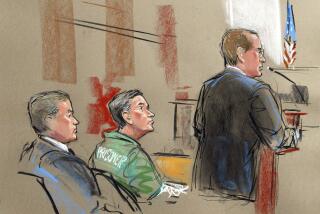Was Ethel Rosenberg wronged?
- Share via
WASHINGTON — Grand jury transcripts released Thursday from the biggest espionage case of the Cold War raise questions about whether Ethel Rosenberg was convicted and executed based on perjured prosecution testimony.
Rosenberg and her husband, Julius, were convicted of passing nuclear weapons secrets to the Soviet Union and were executed in 1953. Since then, decrypted Soviet cables have appeared to confirm that he was a spy, but doubts have remained about her role.
At the Rosenbergs’ trial, the key testimony against Ethel Rosenberg came from her brother and sister-in-law, David and Ruth Greenglass.
They testified that Ethel Rosenberg had typed stolen atomic secrets from notes provided by David Greenglass. The testimony provided the direct involvement that the jury needed to convict and that the judge needed to sentence Ethel Rosenberg to death.
In recent years, David Greenglass recanted his testimony about the typing.
Historians spotted a major omission in Ruth Greenglass’ pretrial grand jury testimony, released Thursday: Ruth Greenglass did not testify that she saw Ethel Rosenberg type up the secrets. In fact, Ruth Greenglass testified that she herself wrote out the secrets in longhand.
Soviet cables described material received from the Rosenbergs as being in longhand.
Ruth Greenglass’ pretrial testimony confirms that her husband’s trial claim was a fabrication, said Georgetown University law professor David Vladeck, who helped gain release of the transcripts.
“The Rosenberg case illustrates the excesses that can occur when we’re afraid,” said Meredith Fuchs, general counsel to the National Security Archive, which also fought for the material’s release.
“In the 1950s, we were afraid of communism. Today, we’re afraid of terrorism. We don’t want to make the same mistakes we made 50 years ago,” Fuchs said.
More to Read
Sign up for Essential California
The most important California stories and recommendations in your inbox every morning.
You may occasionally receive promotional content from the Los Angeles Times.













